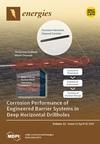跟踪生物燃料创新:基于图表的可持续航空燃料专利分析
IF 3
4区 工程技术
Q3 ENERGY & FUELS
引用次数: 0
摘要
生物燃料的使用是实现可持续未来的一个大有可为的手段,并能带来可观的经济和环境效益。由于生物燃料来自植物油和动物脂肪等有机来源,因此可以减轻温室气体排放的影响,改善空气质量,支持当地农业,创造就业机会,并通过减少对化石燃料的依赖来加强能源安全。然而,将这些替代燃料引入航空领域仍然是一项重大挑战。因此,研究可持续航空燃料(SAF)的潜力并探索如何克服其融入主流航空业的技术障碍以实现更广泛的去碳化目标至关重要。本文旨在通过研究 SAF 的演变过程及其与相关专利的联系,为有关 SAF 的讨论做出贡献。本文是对生物燃料创新的全面研究,强调了学术界、工业界和其他利益相关者之间的复杂关系。希望本研究的结果能让人们更清楚地了解 SAF 创新所涉及的催化剂,并为致力于塑造未来可持续能源技术发展轨迹的政策制定者、学者和该领域的专业人士提供有价值的见解。本文章由计算机程序翻译,如有差异,请以英文原文为准。
Tracking Biofuel Innovation: A Graph-Based Analysis of Sustainable Aviation Fuel Patents
The use of biofuels represents a promising means of achieving a sustainable future and offers considerable economic and environmental benefits. Since they are derived from organic sources, such as vegetable oils and animal fats, biofuels can mitigate the effects of greenhouse gas emissions, improve air quality, support local agriculture, create employment opportunities, and enhance energy security by reducing dependence on fossil fuels. However, introducing these alternative fuels to the aviation sector remains a significant challenge. Thus, it is vital to investigate the potential of sustainable aviation fuel (SAF) and discover how to overcome the technological obstacles to its integration into mainstream aviation to attain broader decarbonization objectives. This article seeks to contribute to a discussion about SAF by examining how it has evolved and its connections to related patents. This article is a comprehensive study of biofuel innovation, highlighting the complex relationships between academia, industry, and other stakeholders. It is hoped that the findings from this study will provide a clearer understanding of the catalysts involved in SAF innovation and provide valuable insights for policymakers, academics, and professionals in the field who are committed to shaping the trajectory of sustainable energy technologies in the future.
求助全文
通过发布文献求助,成功后即可免费获取论文全文。
去求助
来源期刊

Energies
ENERGY & FUELS-
CiteScore
6.20
自引率
21.90%
发文量
8045
审稿时长
1.9 months
期刊介绍:
Energies (ISSN 1996-1073) is an open access journal of related scientific research, technology development and policy and management studies. It publishes reviews, regular research papers, and communications. Our aim is to encourage scientists to publish their experimental and theoretical results in as much detail as possible. There is no restriction on the length of the papers. The full experimental details must be provided so that the results can be reproduced.
 求助内容:
求助内容: 应助结果提醒方式:
应助结果提醒方式:


